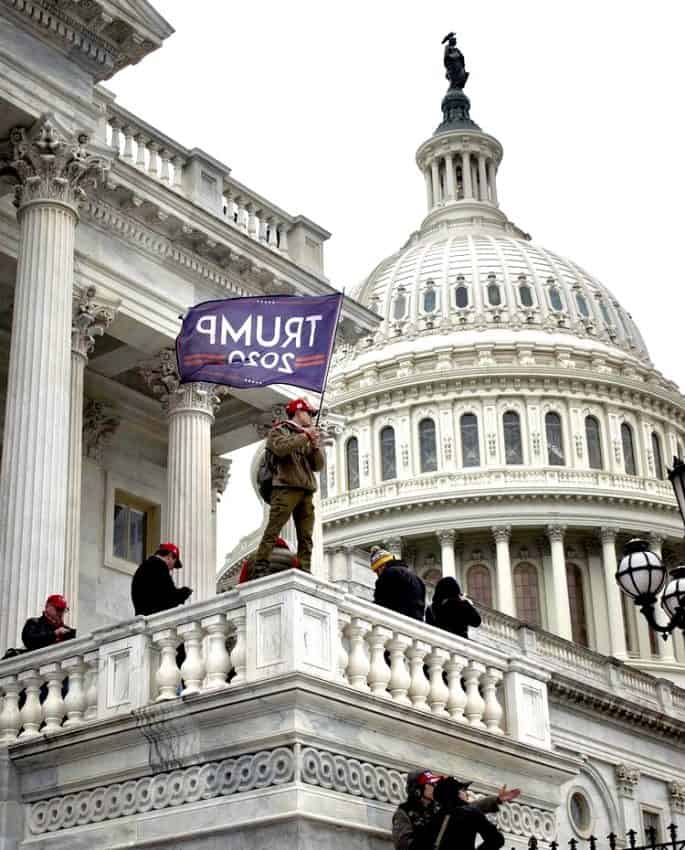
The ultimate illustration of Donald Trump’s lies and rhetoric was the insurrection on the United States Capitol on Jan. 6.
While unprecedented and horrifying to watch, it offers Canadians an opportunity to reflect on the strength of our own political system. I believe there are three main lessons about the importance of an engaged and educated electorate that we must learn to ensure that such disregard for the democratic process does not happen here.
Firstly, we must understand that Canada is not insulated from the populist messages which were foundational to the insurrection. This is not to suggest that Canada is as polarized as the U.S., but the Capitol Hill riots are a warning that populism can take hold anywhere.
Who would have thought that the people that elected America’s first Black president, Barack Obama, would also elect a man who openly used racism and populism as tools to win his election in 2016?
Canadians must remain vigilant and be skeptical of politicians who push ethnocentric and populist messages. This rhetoric creates a type of nationalism which can be destructive, as was exhibited by the actions of Trump’s MAGA supporters.
Second, to keep our institutions strong we need an engaged and educated electorate. Many Americans unfortunately believe that the 2020 presidential election was rigged and that the electoral victory was stolen from Trump. The blame for this sits squarely at the feet of Republican officials who constantly casted doubt on a legitimate and fair election while continually promoting the lie that the election was stolen.
As citizens, we must take it upon ourselves to think critically about the information we are receiving and filter through these false claims.
In Canada, this means calling out politicians who use divisive language, employ racial stereotypes and peddle harmful tropes. Peaceful disagreement and healthy debate are crucial in an equitable society, but the manipulation of facts for political gain is dangerous. Canadians of all ideological bents must call out politicians who purposefully disseminate deceptive information and hold these politicians accountable, especially at the ballot box.
Lastly, these riots remind us that democracy is fragile. The recent events at the Capitol demonstrate just how precarious democracy actually is when it is not robustly defended.
In total, 147 elected Congressional Republican lawmakers voted to overturn the election results — an even scarier fact considering that they voted to do so just hours after the Capitol was stormed. While sanity ultimately prevailed and the election was certified, the sheer number of Republicans who voted to ignore the will of the people is frightening.
While I don’t think Canada is anywhere close to reaching the fever pitch of partisan politics found in the U.S., there are concerning signs happening here which cannot be ignored.
Prairie politicians have increasingly tolerated and even supported ideas of provincial succession. While it is perhaps on a different scale compared to the actions taken by many Republican lawmakers, the underlying anti-democratic sentiment is the same. A vicious undercurrent is growing where some politicians are pursuing ideas of their own, like provincial autonomy, despite having no mandate from voters to do so.
In the end, a country’s democracy is only as strong as the citizens and politicians who constitute it. The recent events on Capitol Hill and the charged rhetoric that led up to them must serve as a warning and a learning opportunity for Canada. All Canadians must reject populist messages, think critically about what politicians are saying and most importantly, remain engaged in the electoral process by voting for competent officials.
While it is natural for citizens to disagree, we cannot let the discussion get to a place where facts are a politicized and contested commodity like they are in the States. As the historian Timothy Snyder recently wrote in The New York Times, “When we give up on truth, we concede power to those with the wealth and charisma to create spectacle in its place.”
Download Meeting minutes from 2022 AGM HEREThis op-ed was written by a University of Saskatchewan undergraduate student and reflects the views and opinions of the writer. If you would like to write a reply, please email opinions@thesheaf.com. Caid Brossart is a fourth-year political studies student and president of the U of S Political Studies Students’ Association.
—
Caid Brossart
Photo: Instagram | @hanbanana124
Leave a Reply